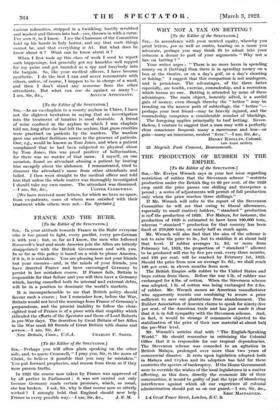THE PRODUCTION OF RUBBER IN THE EMPIRE.
[To the Editor of the SPECTATOR.] Sia,—Mr. Evelyn Wrench says in your last issue regarding restriction of rubber that the Stevenson scheme " restricts production under the British flag to 60 per cent. of the 1920 crop until the price passes one shilling and threepence a pound ; a series of adjustments will permit of full production only when the price reaches three shillings." ' If Mr. Wrench will refer to the report of the Stevenson Committee he will see that owing to liberal allowances, especially to small (native) holders, " standard " production is not the production of 1920. For Malaya, for instance, the production of 1920 is estimated to have been 190,000 tons, whereas " standard " production for that country has been fixed at 270,000 tons, or nearly half as much again.
Mr. Wrench will also find that the aim of the scheme is not to raise the price to 3s., but to stabilize it at about half that level. If rubber averages ls. 3d. or more from February 1st, 1923, the proportion of " standard " allowed to be produced will rise by five per cent. every three months, and 100 per cent. will be reached by February 1st, 1925. Should the price from now on average ls. ad., we shall reach 100 per cent. in eleven months from now.
The British Empire sells rubber to the United States and buys cotton from them. Before the war 1 lb. of rubber was exchanged for 4 lbs. of cotton. When the Stevenson scheme was adopted, 1 lb. of cotton was being exchanged for 2 lbs.• of rubber. Mr. Wrench names an American manufacturer who apparently resents our combining to secure a price sufficient to save our plantations from abandonment. The Rubber Association of America claims to speak for ninety-five per cent. of the American trade and has just made it clear that it is in full sympathy with the Stevenson scheme. And, in fact, it would be strange if consumers objected to the stabilization of the price of their raw material at about half the pre-War level.
Mr. Wrench's articles deal with " The English-Speaking World." He should remember in criticizing the Colonial Office that it is responsible for our tropical dependencies. The Stevenson scheme was conceded to an agitation in British Malaya, prolonged over more than two years of commercial disaster. It rests upon legislation adopted both in Malaya and Ceylon and its adoption has laid for these countries the spectre of bankruptcy. If the Home Government were to override the wishes of the local legislatures in a matter affecting, as this does, directly the economic life of their communities, it would be guilty of just the type of blundering interference against which all our experience of colonial administration should put us on our guard.—I am, Sir, &c.,
1-4 Great Tower Street, London, B.C. 8. ERIC MACFADYEN.










































 Previous page
Previous page